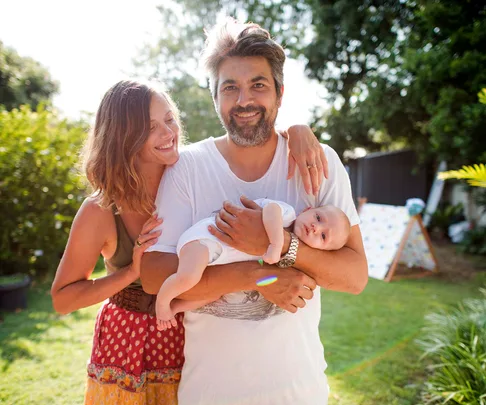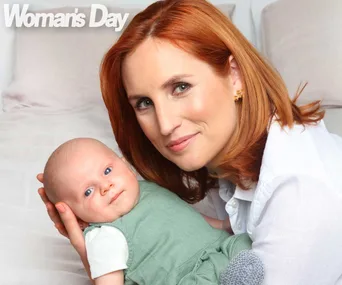When journalist-turned psychologist Darcy Lockman became a mother she assumed that she and her husband would share the parenting work load equally.
But what she found was that despite the fact they both worked outside the home – and her husband was a great dad – it still fell on her to take care of the invisible responsibilities that come with running a family: remembering to bring the nappies, remembering to sign the permission slips, remembering to remember all the little things that needed to be remembered.
After putting their marriage under the microscope Lockman interviewed 50 other mothers and found the same was happening in their homes. The women said their husbands were good fathers but they fell short when it came to taking the reins with their kids.
Why, in dual-income households, were progressive dynamics turning traditional when it came to household expectations?, Lockman asked.
Lockman has written a book, All the Rage: Mothers, Fathers, and the Myth of Equal Partnership, which explores this and while Lockman’s research doesn’t reflect everyone’s experience – our Prime Minister, for example, might say this is not how things look at home – it does tell us that deep-seeded notions of gender roles still stick.
In an interview with Fatherly Lockman says that one of the main reasons inequality at home still exists is “because people still really believe that mothers are the ones who are biologically primed for this”.
“We still think of men as helpers,” she says bluntly. “But, actually, that’s untrue.
“Men are biologically primed for parenthood as well. It seems to be an important part of our evolution because men’s hormones actually shift when they spend time with and have intimate contact with a pregnant partner. The hormones that rise in women also rise in men.”

Lockman says we still primarily believe in the idea that women have a maternal instinct.
Women are “assumed to have this innate child-rearing ability,” she says. “But human beings don’t really have instincts.
“There are animals that rely primarily on instinct to survive. Human beings are not among them. We have a more developed brain and we require learning to survive, which has made us more able to adapt to our environment. So, parenting skills are learned, not innate for males as well as females.”
There’s societal pressure on mothers to perform what is known as “intensive mothering”, she says – putting your child’s needs and considerations first all the time.
“So, fathers are not held to that standard. The bar is different from the get-go for men and women, and we could really question how intensively mothers have been encouraged to parent for the past 25 years.
“There’s a lot of interesting stuff that sociologists have written about it. One thing they note is that expectations for mothering kicked into ever higher gear the more mothers were in the workforce.
“So when working mothers peaked in the labour force in the mid-’90s, that’s when the mothering standard started to rise. People who write about this – these aren’t my ideas – talk about how there was a really profound cultural anxiety around what was going to happen to kids now that mothers were working. Well, the anxiety seemed to be allayed by the idea that mothers were going to try even harder.”
Today, full-time working mothers spend as much time with their children as stay-at-home mothers in the ’70s, Lockman says.
“This is crazy. And they do it by cutting back on their own leisure time, personal care, and sleep.
“There’s very little of this parenting pressure on men. Fathers can show up and be amazing. But if you’re a mother and show up without water and snacks and band-aids and an extra pair of clothes, you’re a villain. I’m exaggerating, but not much.”

There is one more thing, Lockman adds: male privilege.
“Girls and boys are raised so differently, even if not necessarily in their homes. We inhabit really different worlds.
“Girls learn to be communal and think about others all the time; boys learn to put their needs and priorities first. Once a man and a woman are living together, having been raised with these different imperatives, they have different degrees of attention as to what needs to be done for other people. So, and again I don’t think it’s on purpose, but you learn to live a certain way in your gender without so much as realising it.
“There’s stuff that my husband, who I love, does that just makes me go, ‘Wow’. Sometimes when he’s home, he’ll be laying on our bed. And he’s really tall and he lays lengthwise across the bed, and I’ll come in and he won’t move. It’s such a little thing, and he’s not being an a-hole, but he just doesn’t think to move until I ask him to. As a woman, if someone comes into the room and I am taking up extra space, I will automatically make room for them.
“It’s almost startling to take in what cultures girls and boys are moulded by. It’s 100 interactions every day over the course of a lifetime.”
So what do we do about it?
Lockman says, “It’s not the 50-50 split of household management that is the goal. It’s more of a shared awareness of what’s going on in the home. People have other obligations and other things that will result in it being a fluid split.”
Couples that have conversations about how they’re going to share responsibilities before they start a family “do the best”, Lockman says.
“It’s when couples imagine, like my husband and I did, that it’ll just work out that way. That’s when people get into some trouble because things do tend to default to mothers without explicit conversations.”



